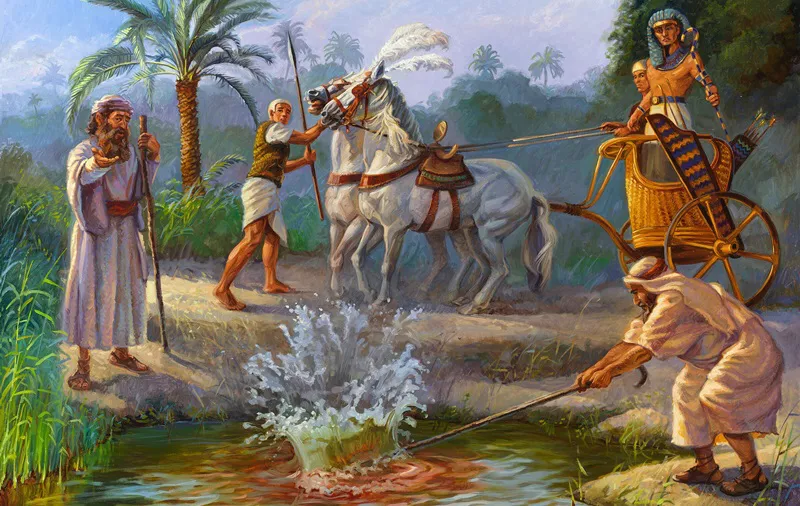The account of Moses turning water into blood is a significant event in the biblical narrative, representing one of the ten plagues of Egypt. This miraculous act is a key moment in the story of the Exodus and serves to demonstrate God’s power over the Egyptian gods and the Pharaoh. In this article, we will explore the specific river involved, the context of this miracle, and its implications for the Israelites and Egyptians.
The River in Question: The Nile
The river that Moses turned to blood is the Nile River, which is the longest river in the world and flows through northeastern Africa. It was crucial to the economy and culture of ancient Egypt, serving as a source of water for drinking, agriculture, and transportation. The Nile was considered sacred, and the Egyptians worshiped it as a god, known as Hapi, who was thought to control the fertility of the land.
Biblical Reference
The turning of the Nile River into blood is detailed in the book of Exodus.
Exodus 7:14-20
“Then the Lord said to Moses, ‘Pharaoh’s heart is unyielding; he refuses to let the people go. Go to Pharaoh in the morning as he goes out to the water. Wait on the bank of the Nile to meet him and take in your hand the staff that was changed into a snake. Then say to him, “The Lord, the God of the Hebrews, has sent me to say to you: Let my people go, so that they may worship me in the wilderness. But until now you have not listened. This is what the Lord says: By this you will know that I am the Lord: With the staff that is in my hand I will strike the water of the Nile, and it will be changed into blood. The fish in the Nile will die, and the river will stink; the Egyptians will not be able to drink its water.”’”
See Also: When Did Taxes Start in the Bible?
The Context of the Miracle
Moses, chosen by God to lead the Israelites out of slavery in Egypt, confronted Pharaoh to demand the release of the Hebrew people. Pharaoh’s refusal led to a series of plagues designed to compel him to let the Israelites go. The first of these plagues was the turning of the Nile River into blood.
The Significance of the Plague
Judgment Against Egyptian Deities: The plague served as a direct challenge to the Egyptian gods. The Nile was a symbol of life and fertility, and by turning it into blood, God demonstrated His sovereignty over the natural world and the Egyptian deities that were believed to control it.
Physical and Economic Consequences: The transformation of the Nile into blood had dire consequences for the Egyptians. The water became undrinkable, and the fish in the river died, leading to a stench that permeated the land. This affected not only drinking water but also the fishing industry, which was vital for food and trade.
Exodus 7:21-24
“They turned the water of the Nile into blood, and the fish in the Nile died, and the river smelled so bad that the Egyptians could not drink its water. Blood was everywhere in Egypt. But the Egyptian magicians did the same things by their secret arts, and Pharaoh’s heart became hard; he would not listen to Moses and Aaron, just as the Lord had said.”
The Reaction of Pharaoh
Despite witnessing this miraculous sign, Pharaoh’s heart hardened, and he refused to relent. His magicians even replicated the miracle through their enchantments, further solidifying his stubbornness. This pattern of disobedience and denial continued throughout the plagues, illustrating the conflict between God’s power and Pharaoh’s pride.
Exodus 7:22-23
“But the Egyptian magicians did the same things by their secret arts, and Pharaoh’s heart became hard; he would not listen to them, just as the Lord had said. Instead, he turned and went into his palace, and did not take even this to heart.”
The Broader Implications
The plague of turning the Nile into blood was more than a display of power; it was a pivotal moment in God’s plan to deliver His people from bondage. It served to:
Demonstrate God’s Authority: The act signified God’s authority over the most significant aspects of Egyptian life and religion.
Foreshadow Future Judgments: This plague set the stage for subsequent miracles and judgments that would lead to the ultimate liberation of the Israelites.
Encourage Faith Among the Israelites: For the Israelites, witnessing the plagues, starting with the Nile turning to blood, served to build their faith in God’s ability to deliver them.
Conclusion
The turning of the Nile River into blood stands as a powerful testament to God’s might and a pivotal moment in the narrative of the Exodus. Through this miraculous event, God not only demonstrated His control over nature but also challenged the very foundations of Egyptian belief. As the Israelites witnessed the unfolding events, their hope for liberation grew, ultimately leading to their journey towards the Promised Land. This story continues to resonate with believers today, reminding them of God’s sovereignty and faithfulness in the face of adversity.
Related topics:
- How Many Daughters Did Gideon Have?
- Why Did Jesus Not Know the Hour?
- How Old Was Jehoash When He Began to Reign?

